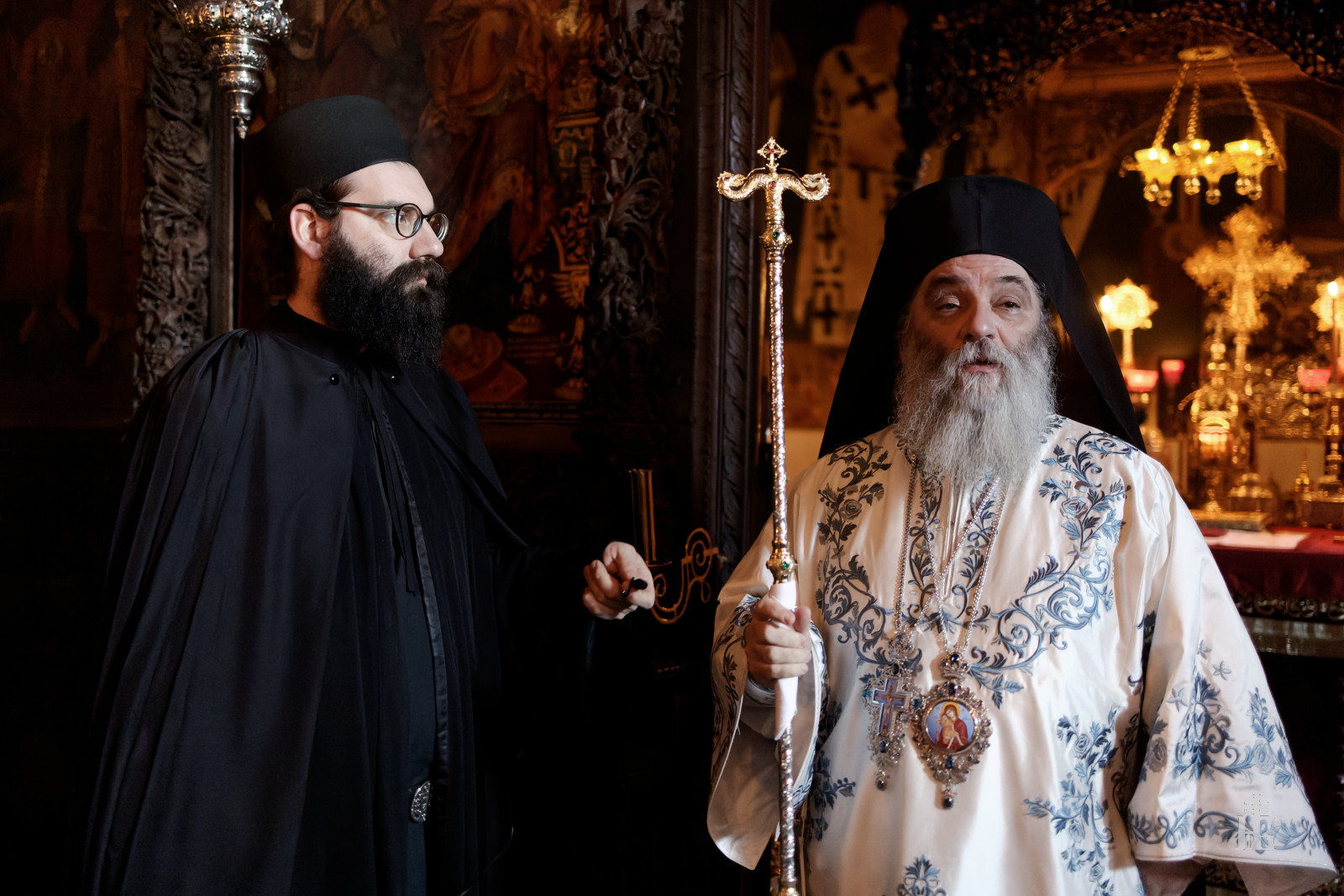Homily of His Grace, Bishop Partenij of Antania, Delivered on the Sunday of Zacchaeus, Following the Gospel Reading at the Divine Liturgy, January 29, 2023, in the Year of the Lord
In the name of the Father, and of the Son, and of the Holy Spirit!
We just heard, beloved brothers and sisters, in today’s Gospel, about an intriguing event from the life of our Savior, the Lord Jesus Christ, involving a resident of the city of Jericho. This man, named Zacchaeus, was a tax collector by profession, serving as the chief tax officer. Undoubtedly wealthy, Zacchaeus was, however, a corrupt man, as he had acquired his riches through unjust means, collecting taxes from the people on behalf of the Roman authorities—likely abusing his position for personal gain. For this reason, he was despised by the common people.
The Gospel account tells us how the Lord Jesus Christ, proclaiming His divine Word, entered the city of Jericho and passed through it. When the news reached Zacchaeus, he felt a burning desire to see Him, to find out who He was. However, by the time Christ was passing through, a large crowd had already gathered along the way, as happened everywhere He went. Zacchaeus, being of short stature, could not rise above the crowd to see Him. The streets were overflowing with people, all eager to catch a glimpse of the extraordinary Visitor. Some hoped to be healed of their illnesses, having heard of His miraculous power, believing He might help them too. Others came out of pure curiosity, captivated by the reports they had heard about Him—an excitement not unlike today’s obsession with sensational news on social media. The Pharisees and the chief priests, also in the crowd, had come for entirely different reasons: to test Him, unable to comprehend or accept how this Man could perform such miracles, convinced that, according to their standards, He could not possibly be the Messiah.

The crowd was immense, and it seemed nearly impossible for the short-statured Zacchaeus to see Jesus among so many people. Yet, driven by the intense desire burning within him, he found a way to see the Divine Teacher. Imagine this wealthy, albeit despised, but well-known man devising a bold and unusual plan: he ran ahead and climbed a sycamore tree. Now, the trees in Israel are not very tall, so even children can climb them. But here was Zacchaeus—so eager to see Jesus that he overcame his shame and climbed the tree by the road where Christ was to pass. He may even have chased away any children in the tree, determined to see for himself the One about whom everyone was speaking.
In a spiritual sense, beloved, we all have a “Zacchaeus” within us, repressed by our passions and sins, weighed down by life’s many trials and burdens. It is our true self, our inner being, stifled by the crowds of this world, weary and burdened by sin. It is not content amidst the vanity of worldly distractions and constantly longs for something higher. Ultimately, it longs to see its Creator, from whom it originated, the only One who can fill it with true joy and peace. Many philosophers, psychologists, and anthropologists have defined man as a being of desire—an entity that constantly desires something. Yet, at the core of all these countless desires lies the fundamental, unquenchable desire to see and be with God. Only when a person is in constant communion with their Creator and Heavenly Father does he feel fulfilled, whole, and perfect. And for such communion with God, the first essential step is the desire to see Him, to come to know Him.
Thus, in order to see Christ, our Creator and God, we must first disregard all other desires—those that are secondary and insignificant compared to the one true desire: to be with Him. We need to channel all our peripheral wants into this one great desire, like the one Zacchaeus displayed in today’s Gospel: to see Jesus and to know who He is. When such a strong desire arises within us, believe me, God will see us first and approach us; He will dwell within us. This is, after all, the primary reason for His coming to earth in human form—to give us the opportunity to see Him, to hear Him, to touch Him, to come to know Him, to befriend Him, and to be saved by Him.
The Lord, who knows the hearts and thoughts of all people, had already seen Zacchaeus’ desire from afar—his readiness to repent and change his life. Thus, when Christ came to the sycamore tree, even though He was surrounded by a multitude of people, He not only noticed Zacchaeus but addressed him directly, calling him by name: “Zacchaeus, hurry and come down, for today I must stay at your house” (Luke 19:5).
This response shocked everyone, including Zacchaeus himself. Despised by the crowd, and even by himself, he had not thought himself worthy of such an honor. All he wanted was a glimpse of Christ from the tree, thinking that would be enough to make him happy. But when God recognizes our desire to know Him and commune with Him, He comes to dwell within the house of our heart and desires to remain there. “So he hurried down and welcomed Him joyfully” (Luke 19:6).
There is a striking moment in the story of Zacchaeus, where the ugliest forms of human envy and malice come to light. When Jesus decided to enter the home of this tax collector, a despised sinner, a group of Pharisees and chief priests immediately seized the opportunity to condemn and humiliate Christ before the people: “When they saw this, they all murmured, saying, ‘He has gone in to be the guest of a man who is a sinner’” (Luke 19:7). This reaction echoes the judgment of Simon the Pharisee, who, as the Gospel tells us, criticized Jesus when a sinful woman came to anoint Him: “If this man were a prophet, He would know who and what kind of woman is touching Him, for she is a sinner” (Luke 7:39).
However, the Lord knew the hearts of all those pressing around Him, just as He knew the heart of Zacchaeus. He allowed the malice to surface, so that the wicked thoughts hidden in their minds might be revealed through their words, giving rise to judgment and slander. Consider how often we hastily judge things we only see outwardly, without knowing the truth or the context behind them. Similarly, the Pharisees immediately condemned Jesus, accusing Him of poor judgment and of setting a bad example by entering the house of a notorious sinner who had amassed wealth unjustly. Gathered around Him, they stirred up the people with murmuring, eagerly waiting to see what would happen next. In their eyes, the image of Christ was already tarnished. It seemed as though evil was triumphant.

But what happened instead? When God touches a person’s heart, it undergoes an instant transformation—it becomes different from before. It becomes filled with love and compassion, ready to perform good deeds and to give itself for others. Thus, touched by the overwhelming love of the One who had honored him by entering his home, Zacchaeus rejoiced and was filled with gratitude that his desire to encounter Christ had been met with such mercy and kindness. At that moment, Zacchaeus became a new man. He fulfilled the purpose for which Christ came into the world: to make us new creations, to transform the world starting from the heart. When Christ enters the heart, every person is made new.
This is exactly what happened with Zacchaeus. We just heard how the once sinful and despised tax collector underwent a sudden transformation: “And Zacchaeus stood and said to the Lord, ‘Behold, Lord, half of my goods I give to the poor, and if I have defrauded anyone of anything, I restore it fourfold’” (Luke 19:8). Transformed by God’s love, Zacchaeus promised not only to repay what he had taken unjustly but to restore it fourfold—and even to give half of his wealth to the poor. And he kept his promise. From his life story, we learn that Zacchaeus became a faithful disciple of the Lord Jesus Christ, eventually becoming the first bishop of Jericho. Truly, love works the greatest miracle!
Just as Christ responded to Zacchaeus’ desire with love, so too does He respond to our desire to see Him. Therefore, beloved, let us also strive to see Christ by rising above the distractions and vanity of daily life. If we wish to change and become new people—and if we want everything around us to move toward the good—then we must cultivate the field of our heart, making it ready to meet the Lord. Communion with God begins with a deep, primal desire to seek Him and to be with Him. And God, for His part, will never leave this desire unanswered. As we have said, God knows the heart and immediately recognizes which heart truly seeks Him. God is not a tyrant over our free will—He implanted it as a sacred law within us—and therefore, the most important step is that we desire Him. For God undoubtedly wants to be with us; it is up to us to want to be with Him.
Through many signs, God reveals that He loves us, desires to be with us, and is the only one who can change and save us. Zacchaeus, too, had heard extraordinary things about Jesus—how He performed miracles, healed the sick, and spoke words that nourished and comforted souls. These are the same signs we see and experience today. Miracles happen constantly around us and within us. Let us not forget the greatest miracle of all: the Resurrection from the dead, by which Christ transformed all of humanity and altered the course of history.
Therefore, let us seek Christ, and He will say to us, “I want to stay at your house, in your heart, because you desire it.” Let us pray that this essential desire is born in our hearts so that we too may begin to experience the transformation that we so desperately need.
Amen.















